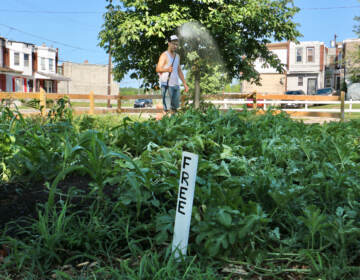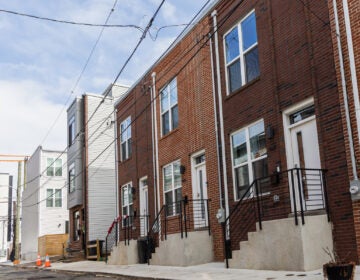Philly Council President wants to increase transparency of city land sales
A new bill aims to increase the transparency and efficiency of Philadelphia’s politicized process for selling vacant city land.

A vacant lot maintained by PHS through the Vacant Lot Stabilization program located on 6th and Berks. (PlanPhilly, file)
This article originally appeared on PlanPhilly.
—
A new bill introduced at City Council’s final session before summer recess aims to increase the transparency and efficiency of Philadelphia’s politicized process for selling vacant city land.
The bill would also reduce council’s own power over municipal land sales by eliminating the opaque Vacant Property Review Committee.
“We want to fold all the publicly-owned land into one inventory and have one policy as it relates to it,” the bill’s sponsor, City Council President Darrell Clarke, said. “We want to make it a much more palatable process for both developers and the community.”
The legislation is co-sponsored by Councilmembers Maria Quiñones-Sánchez, Kenyatta Johnson, and Jannie Blackwell.
The bulk of the city’s publicly-held land is split between the Department of Public Property, the Redevelopment Authority, and the Philadelphia Land Bank. Clarke’s legislation is meant to codify a uniform land disposition policy between them. Regardless of the fate of the new bill, the staff of all of these agencies will be consolidated on July 1 with the eventual goal of moving all city land and responsibility under the land bank’s control.
Clarke’s new legislation, which will be debated in the fall, spells out a precise time frame and guidelines for the city’s competitive land sales. It includes a provision that requires the agency to decide which purchaser to sell land to within 180 days of the close of the bidding process.
Clarke’s legislation would codify how bidders will be weighted, with the most points — 30% — being given for “economic opportunity and inclusion. The second most important factor will be the development team’s level of experience, which will be weighted at 25%. Social impact and feasibility will also be heavily weighted, both at 20%, while the offer price will have the smallest effect on who wins the bid at only 5%.
Clarke said Thursday that veteran developers too often win city land when it is put up for sale, putting newcomers and minority businesses at a disadvantage.
The new scoring criteria is designed to allow for greater minority participation and small business development.
“I would say easily less than 10% of the properties go to minority developers,” said Clarke of the current land sale process. “We will create a scoring system that establishes a more inclusive process, because the simple reality is that the usual suspects with the most revenue are always, always the recipients of publicly owned land.”
There are exceptions that will allow some publicly held land to be exempted from the new scoring and bidding process. The bidding process can be avoided if an applicant wants to buy a property for use as a side yard, a non-profit community garden, or a development that is over 51% comprised of affordable or mixed-income housing.
The bill clarifies that the land bank and its board will be charged with both reviewing the application and ensuring that a purchaser is actually using a property for a side yard or that a larger developer is delivering the promised social impact.
Under the new bill, the role of the Vacant Property Review Committee (VPRC) will be eliminated entirely and its powers eventually shifted to the land bank.
Longtime observers of the city’s troubled land sale process say that the bill’s elimination of the VPRC is a step in the right direction.
Many of the land sale scandals in recent years hinged on political influence over the VPRC.
When Quiñones-Sánchez fought to create the Philadelphia Land Bank in 2012, she tried to keep the VPRC out of its deliberations.
Back then, Council President Clarke fought to entwine the VPRC with the land bank’s sales. The fact that these two politicians are now co-sponsoring legislation to get rid of the body signals progress, says Lauren Vidas, who used to sit on the land bank’s board.
“That was a big point of contention between Clarke and Quiñones-Sánchez when the land bank was created,” said Lauren Vidas, who recently ran unsuccessfully against Johnson in the municipal primary.
“By keeping the VPRC, they didn’t cut out any steps to the land sales process, you just added more,” Vidas said. “And the history of the VPRC was that they were just operating in the dark with no rules or guidelines, often operating at the behest of councilmembers.”
Vidas also said that the land bank will need an increase in resources and staffing if the proposed regulations are passed into law
Clarke says that he doesn’t see the VPRC as the principle impediment to smooth municipal land sales in the city. Instead, he lays the blame with the PRA and the land bank.
But establishing a uniform disposition process for all city land, as this bill seeks to do, would reduce hurdles met across city agencies, he said.
The legislation introduced Thursday will be taken up again in the fall.
WHYY is your source for fact-based, in-depth journalism and information. As a nonprofit organization, we rely on financial support from readers like you. Please give today.







